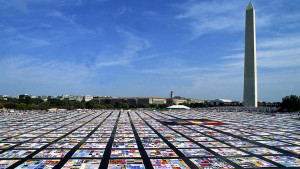Thoughts on World AIDS Day
Dec 04, 2012 by Victoria Noe, in AIDS
, caregiving
, Friend Grief
, friends
, Grief
, United in Anger
, World AIDS Day
 |
| AIDS Memorial Quilt National Mall, Washington DC |
Early in the week I completed the first draft of the second book in the Friend Grief series: Friend Grief and AIDS: Thirty Years of Burying Our Friends. As the week progressed, that high was sustained by anticipation. I was going to a screening of United in Anger and then to a memorial service, organized by a friend and led by my former pastor.
But in between the book draft and Saturday, that anticipation became tempered with frustration. The first World AIDS Day was in 1988: why are we still commemorating it? Why do we still need to commemorate it?
By Friday, my frustration had hardened into anger. I wanted to scream at news people who talked about “celebrating” World AIDS Day. “Celebrating”? What exactly are we celebrating – 34 million people infected and another 30 million already dead? Little children in Africa who are raped because superstition holds that having sex with a virgin will cure AIDS? Young gay men getting infected on purpose, to access social services and the sympathy of their peers?
On World AIDS Day, I sat through United in Anger, an excellent new documentary about ACT UP, still angry.
At the memorial service that evening, I calmed down a bit. The opening hymn was one that always makes me cry, so perhaps that was all I needed to get rid of some of that anger. I listened to testimony from people living with AIDS, men who, years ago, would have never willingly offered their full names.
What I ultimately took away from the service – and the documentary – was that AIDS is one of those issues, one of those moments in time. It brought out the worst in a lot of people, and still does. It seems inconceivable that it could bring out the best in people, too.
The professor who led the Q&A after the film looked remarkably unremarkable. But this gentle man had been a member of ACT UP Chicago, demonstrating and sitting-in to demand better treatment for his dying friends.
The priest who led the memorial service admitted his homophobia and fear when the epidemic began: attitudes that changed when he witnessed the bravery of friends taking care of their friends.
And that is, finally, what I took away from the day: the bravery of friends. Abandoned by families, many people with AIDS had/have no one left to turn to.
Their friends fought for them, cared for them, buried them. And some have been doing it for decades.
Perhaps what we really need is a World Friends Day.
To learn more about United in Anger, click here.

